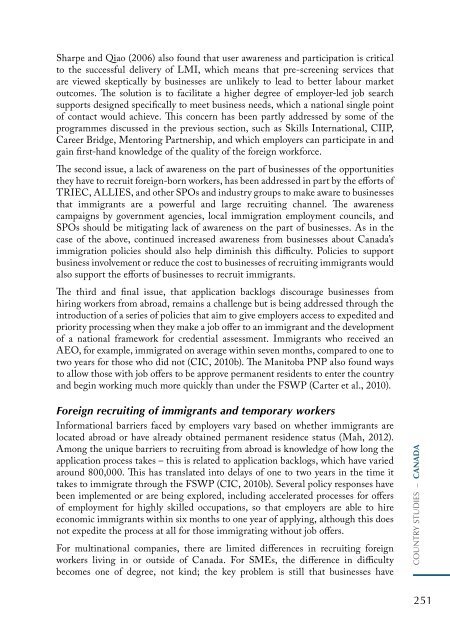International Organization for Migration (IOM)
International Organization for Migration (IOM)
International Organization for Migration (IOM)
Create successful ePaper yourself
Turn your PDF publications into a flip-book with our unique Google optimized e-Paper software.
Sharpe and Qiao (2006) also found that user awareness and participation is critical<br />
to the successful delivery of LMI, which means that pre-screening services that<br />
are viewed skeptically by businesses are unlikely to lead to better labour market<br />
outcomes. The solution is to facilitate a higher degree of employer-led job search<br />
supports designed specifically to meet business needs, which a national single point<br />
of contact would achieve. This concern has been partly addressed by some of the<br />
programmes discussed in the previous section, such as Skills <strong>International</strong>, CIIP,<br />
Career Bridge, Mentoring Partnership, and which employers can participate in and<br />
gain first-hand knowledge of the quality of the <strong>for</strong>eign work<strong>for</strong>ce.<br />
The second issue, a lack of awareness on the part of businesses of the opportunities<br />
they have to recruit <strong>for</strong>eign-born workers, has been addressed in part by the ef<strong>for</strong>ts of<br />
TRIEC, ALLIES, and other SPOs and industry groups to make aware to businesses<br />
that immigrants are a powerful and large recruiting channel. The awareness<br />
campaigns by government agencies, local immigration employment councils, and<br />
SPOs should be mitigating lack of awareness on the part of businesses. As in the<br />
case of the above, continued increased awareness from businesses about Canada’s<br />
immigration policies should also help diminish this difficulty. Policies to support<br />
business involvement or reduce the cost to businesses of recruiting immigrants would<br />
also support the ef<strong>for</strong>ts of businesses to recruit immigrants.<br />
The third and final issue, that application backlogs discourage businesses from<br />
hiring workers from abroad, remains a challenge but is being addressed through the<br />
introduction of a series of policies that aim to give employers access to expedited and<br />
priority processing when they make a job offer to an immigrant and the development<br />
of a national framework <strong>for</strong> credential assessment. Immigrants who received an<br />
AEO, <strong>for</strong> example, immigrated on average within seven months, compared to one to<br />
two years <strong>for</strong> those who did not (CIC, 2010b). The Manitoba PNP also found ways<br />
to allow those with job offers to be approve permanent residents to enter the country<br />
and begin working much more quickly than under the FSWP (Carter et al., 2010).<br />
Foreign recruiting of immigrants and temporary workers<br />
In<strong>for</strong>mational barriers faced by employers vary based on whether immigrants are<br />
located abroad or have already obtained permanent residence status (Mah, 2012).<br />
Among the unique barriers to recruiting from abroad is knowledge of how long the<br />
application process takes – this is related to application backlogs, which have varied<br />
around 800,000. This has translated into delays of one to two years in the time it<br />
takes to immigrate through the FSWP (CIC, 2010b). Several policy responses have<br />
been implemented or are being explored, including accelerated processes <strong>for</strong> offers<br />
of employment <strong>for</strong> highly skilled occupations, so that employers are able to hire<br />
economic immigrants within six months to one year of applying, although this does<br />
not expedite the process at all <strong>for</strong> those immigrating without job offers.<br />
For multinational companies, there are limited differences in recruiting <strong>for</strong>eign<br />
workers living in or outside of Canada. For SMEs, the difference in difficulty<br />
becomes one of degree, not kind; the key problem is still that businesses have<br />
country studIes – CANADA<br />
251


